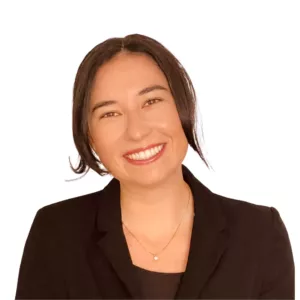An Invitation to move with Empathy towards Identity
Let’s come back to where we started with the phrase “si se puede.” Alexia Salvatierra distinguishes that safety for all may not be feasible for some. Instead she offers up a solution: in the face of safety refused in isolation, we must fight for agency forged in community. She shares how this agency instills a sense of hopefulness. Yet, for women this agency can sometimes feel futile. Being placed in positions where abuse was perpetrated left Dr. Salvatierra feeling like she needed to seek out a position of power, yet she saw how antithetical the pursuit of power was in light of Jesus’ death on a cross. She looked to a faith embodied in the powerlessness of the cross and the redemptive nature of the resurrection. She came to see that the face of suffering love is where power is won, and where strength is gained. If this isn’t risky love, I don’t know what is. It is risky to surrender ourselves in response to the needs of another. Our activism in reciprocity helps us fully taste what it means to be known and loved in the fullness of our identity as children of God.
An Aboriginal activist wrote that “if you have come to help me, please go away. But, if you have come because your liberation is bound up with mine, let us work together.” Liberation is not only about reclaiming one’s own individual identity but recognizing the larger implications that community plays in shaping one’s conocimiento (sense of knowing). Dr. Salvatierra shares a story about a couple within her Spanish-speaking congregation in Central Valley, CA. This couple was really dug in fighting, repeating the same arguments day after day. She shared that she had tried everything she knew from her pastoral care training and nothing was working. Until one day she stopped them and explicitly asked them to just stop and listen to the other from the heart. The couple paused, looked at each other, and gave the other the opportunity to share their perspective. For this couple, empathetic listening changed everything. Humanistic psychologist Dr. Carl Rogers was a significant contributor to our current understanding of empathetic listening today within the context of person-centered therapy. To listen empathetically is to reflect and embody the emotions of the other person sharing. This person centered listening extends beyond clinical practice. Empathetic listening is a way of being and relating to those we do life with. It is a way of providing a space for our individual identities to thrive communally.
Identity is not just about acknowledging who we think we are, it is about listening to the voices within our communities–listening for the stories that tell us who we are collectively. Empathetic listening makes space for us to wholeheartedly embrace the other. It makes space for us to embrace Ubuntu. It makes space for us to pursue banta. When we work collaboratively, we have the capacity to say confidently “si, se puede” not as a shallow plea but as an affirmation of the integrative ways our identity is shaped by the people around us.
Let’s get Curious & Creative!
Identity formation is caught within community. Consider inviting others into these curiosities with you as you learn to identify the various parts of your identity that make up who you are within the contexts and communities you find yourself in.
- We now invite you to explore your autohistoria. Everyone expresses themselves differently. For some, poetry and writing serve as a mechanism of expression; for others, dance or yoga provide an embodied expression of self. For others, painting, photography, or filmmaking serve as meaning making mechanisms. However you choose to engage with your story, we invite you to give yourself ample time and space to do so.
- You might choose to do this incrementally over a few weeks or set aside an extended period of time. If you are someone who enjoys structure and prefers to “color inside the lines,” let this be an exercise in letting go of expectations of what the final outcome will be. This exercise is for you to better understand your story and your identity. Because we believe that in learning more about yourself, you learn more about your faith, and more about the people and places that formed you.
References
Salvatierra, A., & Wrencher, B. (2022). Buried Seeds: Learning from the Vibrant Resilience of Marginalized Christian Communities. Baker Publishing Group.
Comas-Diaz, L., & Vazquez, C.I. (Eds.). (2018). Latina Psychologists: Thriving in the Cultural Borderlands (1st ed.). Routledge. https://doi-org.fuller.idm.oclc.org/10.4324/9781315175706
Continue Exploring

Thriving
The Divine Individuality of a Thriving Life
Our environments impact how we thrive. If our environments don’t support us, what can we do to support ourselves?

Blog
Identity: We Not Me (Part 1)
What is our identity? How do we discover it? What would it look like to define our identity through the communities we participate in?

Blog
Identity: We Not Me (Part 2)
How do our families shape our identities? By sharing our stories, or our tesimonios, we can gain insight into ourselves and communities.
